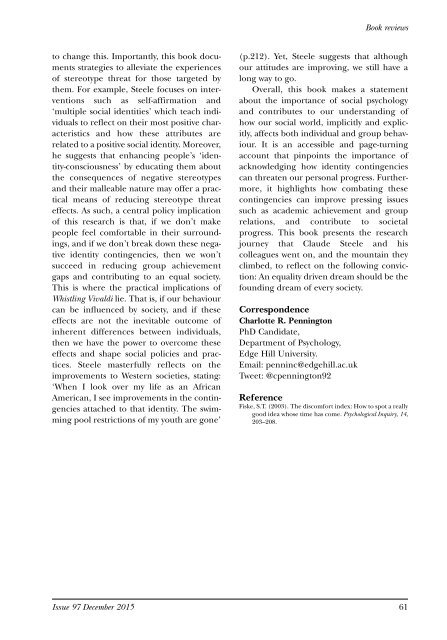Social Psychology Special Issue
PsyPAG-Quarterly-Issue-973
PsyPAG-Quarterly-Issue-973
Create successful ePaper yourself
Turn your PDF publications into a flip-book with our unique Google optimized e-Paper software.
Book reviews<br />
to change this. Importantly, this book documents<br />
strategies to alleviate the experiences<br />
of stereotype threat for those targeted by<br />
them. For example, Steele focuses on interventions<br />
such as self-affirmation and<br />
‘multiple social identities’ which teach individuals<br />
to reflect on their most positive characteristics<br />
and how these attributes are<br />
related to a positive social identity. Moreover,<br />
he suggests that enhancing people’s ‘identity-consciousness’<br />
by educating them about<br />
the consequences of negative stereotypes<br />
and their malleable nature may offer a practical<br />
means of reducing stereotype threat<br />
effects. As such, a central policy implication<br />
of this research is that, if we don’t make<br />
people feel comfortable in their surroundings,<br />
and if we don’t break down these negative<br />
identity contingencies, then we won’t<br />
succeed in reducing group achievement<br />
gaps and contributing to an equal society.<br />
This is where the practical implications of<br />
Whistling Vivaldi lie. That is, if our behaviour<br />
can be influenced by society, and if these<br />
effects are not the inevitable outcome of<br />
inherent differences between individuals,<br />
then we have the power to overcome these<br />
effects and shape social policies and practices.<br />
Steele masterfully reflects on the<br />
improvements to Western societies, stating:<br />
‘When I look over my life as an African<br />
American, I see improvements in the contingencies<br />
attached to that identity. The swimming<br />
pool restrictions of my youth are gone’<br />
(p.212). Yet, Steele suggests that although<br />
our attitudes are improving, we still have a<br />
long way to go.<br />
Overall, this book makes a statement<br />
about the importance of social psychology<br />
and contributes to our understanding of<br />
how our social world, implicitly and explicitly,<br />
affects both individual and group behaviour.<br />
It is an accessible and page-turning<br />
account that pinpoints the importance of<br />
acknowledging how identity contingencies<br />
can threaten our personal progress. Furthermore,<br />
it highlights how combating these<br />
contingencies can improve pressing issues<br />
such as academic achievement and group<br />
relations, and contribute to societal<br />
progress. This book presents the research<br />
journey that Claude Steele and his<br />
colleagues went on, and the mountain they<br />
climbed, to reflect on the following conviction:<br />
An equality driven dream should be the<br />
founding dream of every society.<br />
Correspondence<br />
Charlotte R. Pennington<br />
PhD Candidate,<br />
Department of <strong>Psychology</strong>,<br />
Edge Hill University.<br />
Email: penninc@edgehill.ac.uk<br />
Tweet: @cpennington92<br />
Reference<br />
Fiske, S.T. (2003). The discomfort index: How to spot a really<br />
good idea whose time has come. Psychological Inquiry, 14,<br />
203–208.<br />
<strong>Issue</strong> 97 December 2015 61


